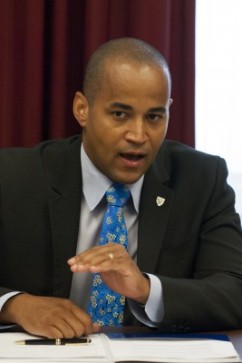
Disparte for HuffPost Blog: Ex-Im and the Pax Americana
The following post was originally published on The Huffington Post Blog by Business Council for American Security Chairperson Dante A. Disparte.
“For more than 80 years, the Export-Import Bank of the United States has played a central role in facilitating market access for U.S. firms and for providing a fixed price on the uncertainty and credit risk of international trade. Ex-Im quite literally paved the way for the Pax Americana by financing the Pan-American Highway, road networks in Southeast Asia and the reconstruction of Europe under the Marshall Plan following World War II. Ex-Im is such an enduring institution, much like the FDIC, because its mission was borne out of vacuum left behind by a chaotic period in which private resources evaporated and confidence in the system waned. The FDIC was formed in the crucible of bank runs and financial panic following the Great Depression, while Ex-Im, in its 1945 charter, was forged from the wreckage of a tattered global economy, in which the U.S. was the world’s principal economic and trade guarantor.
While no depositor, consumer or politician can imagine a vibrant U.S. economy without the FDIC, sadly, many are actively conspiring for Ex-Im’s demise. Ex-Im’scurrent mandate from Congress, which was authorized in September of 2014 expires on June 30, 2015. In the same way that allowing the FDIC to lapse would seriously erode consumer confidence, unilaterally dismantling Ex-Im would have similar consequences for U.S. trade. No one would feel the adverse effects more than America’s small businesses, which make up 90 percent of Ex-Im’s customers and comprise 64 percent of net new private sector jobs according the SBA data. Much like the partisanship that cost the U.S. its AAA credit rating, many who are sent to Washington, D.C. to improve U.S. competitiveness are waging economic and ideological warfare against the nation.
Ex-Im’s critics cite economic favoritism for large, blue chip exporters such as Boeing and Caterpillar. While these large firms clearly benefit from Ex-Im’s support, the criticism overlooks the importance of small businesses in the supply chains of large global manufacturers. In fact, Joe Kaeser, the CEO of Siemens, a German engineering powerhouse employing 46,000 people in the U.S. indicated that for every $1 million in revenue they earn, $300,000 benefits small businesses. This much is set in Ex-Im’s targets, which calls for a minimum of 20 percent of their financial and trade credit support be directed to small and mid-sized businesses.
In the last few years of straitened times, putting an organization that paid back $675 million to taxpayers in 2014 in the crosshairs is a dangerous game of brinkmanship that is already harming U.S. exports. Another oft cited criticism is that Ex-Im crowds out private financial institutions and misprices risks by leveraging the Treasury’s balance sheet and access to unattainably cheap capital. While this may be true in terms of access to favorable capital, as a self-funded government institution, Ex-Im’s return on investment to taxpayers makes it an asset rather than a liability. Adding Ex-Im’s low default rate of 0.175 percent and strong capital adequacy covering 17 times the Bank’s default rate makes it a benchmark institution, rather than a threat to the private sector. Not crowding out private sector financial institutions is also enshrined in Ex-Im’s charter.
So much of Ex-Im’s role in the U.S. economy is to fill the void where others dare not tread. Ninety-five percent of global consumers are outside of the U.S. and there are more than 60 export credit agencies (ECAs), many operating opaquely, vying to promote their national exports. Not reauthorizing Ex-Im would be tantamount to unilateral disarmament during an era of an enfeebled global economy where the U.S. is the only piston. Christine Lagarde, the head of the IMF, recently referred to this era as a “new mediocrity,” in which key economic indicators are moving in dangerous lockstep. With near parity between global GDP growth and growth in trade, economic headwinds are exacerbated by low productivity and persistently high urban unemployment. Without trade facilitation tools like Ex-Im in the U.S. economic arsenal, we risk putting the global economy in reverse and sending millions of American workers to the unemployment line. While the consequences of not reauthorizing Ex-Im are stark, a world where Ex-Im has an open-ended charter is not a zero-sum proposition for U.S. exporters or other nations. In fact, as evidenced by the largely peaceful 70 years since Ex-Im’s modern charter, countries that trade together tend to stay together.
Against this backdrop, ongoing trade negotiations under the Trans-Pacific Partnership (TPP) and the Trans-Atlantic Trade and Investment Partnership (TTIP), are heralding an era of 21st century trade agreements. The U.S. economy stands to be a center of gravity in these agreements and U.S. firms of all sizes will need to evaluate both their market expansion strategies and trade posture. TPP alone would create access to 40 percent of the world’s GDP and net $295 billion in new economic output according to the IMF. So, rather than conspiring to put a nail in Ex-Im’s coffin harming the U.S. and, indeed, the global economy, officials should work to bolster and modernize Ex-Im. After all, Ex-Im’s support for $27.4 billion in trade deals in 2014 pales in comparison to the $670 billion worth of trade financed by China in the last 2 years – $80 billion more than all the trade supported by Ex-Im over its 80 year history. In the veritable export credit arms race being waged around the world, disarming Ex-Im is a dangerous move imperiling U.S. national security.”





